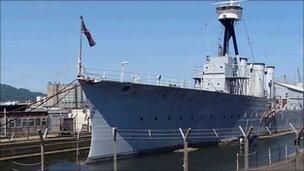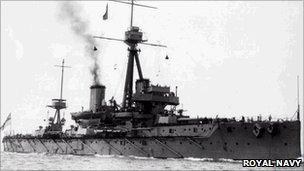WWI ships to chart past climate
- Published

WWI cruiser HMS Caroline can still be seen at Alexandra Dock in Belfast
A new project aims to use old Royal Navy logbooks to help build a more accurate picture of how our climate has changed over the last century.
The public are being called upon to re-trace the routes taken by some 280 Royal Navy ships including historic vessels.
We volunteers will transcribe information about weather, and other events, from images of ships' logbooks.
This will help provide invaluable information about the past climate.
The project, called OldWeather.org, external, will also help fill in gaps in our knowledge of an important stage in British history.
"These naval logbooks contain an amazing treasure trove of information but because the entries are handwritten they are incredibly difficult for a computer to read," said Dr Chris Lintott of Oxford University, one of the team behind OldWeather.org
"By getting an army of online human volunteers to retrace these voyages and transcribe the information recorded by British sailors we can re-live both the climate of the past and key moments in naval history."
Mobile weather stations
Dr Peter Stott, head of climate monitoring and attribution at the UK Met Office, said: "Historical weather data is vital because it allows us to test our models of the Earth's climate: if we can correctly account for what the weather was doing in the past, then we can have more confidence in our predictions of the future.
"Unfortunately, the historical record is full of gaps, particularly from before 1920 and at sea, so this project is invaluable."

Logbooks from WWI ships such as HMS Dreadnought could also reveal important historical information
Most of the data about past climate comes from land-based weather monitoring stations which have been systematically recording data for over 150 years.
Those behind the OldWeather.org project say that the weather information from the WWI ships - which spans the period 1905-1929 - effectively extends this network to 280 mobile, seaborne weather stations.
Web volunteers are rewarded by rising through the ranks from cadet to captain of a particular ship, according to the number of pages they transcribe.
The project followsin the footsteps of previous "citizen science" projects such as Stardust@Home, Einstein@Home, Galaxy Zoo and Moon Zoo. It will also contribute to historical knowledge about WWI.
OldWeather.org features logbooks from historically important ships including HMS Caroline, which survived the Battle of Jutland and is still in existence in Belfast.
"Life in the trenches is well documented but the maritime struggle that took place during World War One is less well known," said historian Gordon Smith of Naval-History.Net.
"This was a global conflict that reached across the world's oceans to every part of the globe and was about far more than just the Battle of Jutland.
"We hope these new records will give people a fresh insight into naval history and encourage people to find out more about Britain's naval past and the role their relatives played in it."